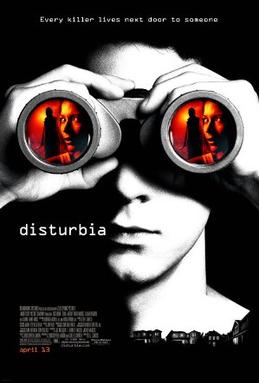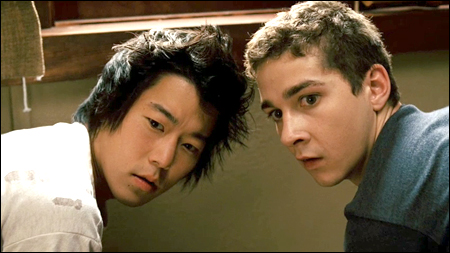

Director: D.J. Caruso, 2007.
Disturbia is a Rear-Window remake aimed specifically at the teen market. Fifty years after Hitchcock's famous suspense thriller, most teenagers will not have seen that classic. Shia LaBeouf carries the movie in the Jimmy Stewart role. He is a likable everyman-teen, but more in the manner of a young John Cusack. Where Rear Window was set in the city, this is set in the suburbs: hence the title Disturbia (disturb suburbia).
The opening scene, which was improvised, has Kale (LeBeouf) fly fishing in an idyllic river with his dad (the journeyman actor Matt Craven, recently seen in A Simple Curve). Their bantering conversation about a fish is a clear portent of things to come: "Do you think he sees us?" asks Kale. His dad answers, "No, he can't see us. But trust me, he can feel us watching." This is the plot of the rest of the film.
Life throws Kale a curve-ball when he crashes their car on the ride home, and tragically he sees his dad killed. A year later, he has still not recovered emotionally. His grief is impacting his school work, and when he punches his Spanish teacher in the face he is sentenced to three summer months of house arrest. He has an ankle bracelet attached that will allow him to go no further than his front lawn before sending a signal to the police. Going further will lead him straight to jail. This is bad bling.

When his mom (Carrie-Ann Moss from The Matrix is miscast here as a suburban widow) pulls the plug on his technology entertainment, Kale resorts to voyeurism. He begins spying on his neighbors. There are the young brats watching porn in their bedroom, the philandering wife who is having an affair, the sexy new-girl Ashley (Sarah Roemer) who loves swimming topless in her pool, and the shy loner Mr. Turner (David Morse) who just might be a serial killer.
This first act of Disturbia takes way too long. Several times I was ready to copy Kale's mom and pull the plug on this film. But I stuck with it and was rewarded with a predictable thriller that was executed mechanically and gave a few moments of white-knuckle suspense.
 When Kale starts to suspect Mr Turner is more than he seems, the film kicks into gear. Soon, Ashley joins Kale and goofy buddy Ronnie (Aaron Yoo) in their spying sessions. Morse gives Turner a s sinister feel, but only enough that he could just be an honest neighbor. When he finds out they are intruding on his privacy, spying on him, Disturbia becomes creepy and suspenseful.
When Kale starts to suspect Mr Turner is more than he seems, the film kicks into gear. Soon, Ashley joins Kale and goofy buddy Ronnie (Aaron Yoo) in their spying sessions. Morse gives Turner a s sinister feel, but only enough that he could just be an honest neighbor. When he finds out they are intruding on his privacy, spying on him, Disturbia becomes creepy and suspenseful.By the time Disturbia comes to its violent conclusion, the implausibility is ignored. With dark basements hiding shocking secrets, improbable hidden rooms and tunnels, one wonders how Mr. Turner could have done the remodeling needed to make this a Hannibal Lecter model-home without drawing attention to himself. But viewers will forget these questions being drawn along by the inexorable motion of the final act.
Disturbia is not a deep film, and presumably was not intended to be. But its underlying theme of teen entitlement, clear in Kale's approach to his initial confinement, is ethically questionable. As followers of Christ, what are we really entitled to? If we are American citizens we can point to the rights built into the US constitution, but our citizenship is now primarily in heaven. As such, Paul calls us to consider others first (Phil. 2:3-4). Entitlement is a word that carries no weight in God's kingdom.
 Disturbia also raises the issue of privacy and spying on neigbors. Jesus tells us to love our neighbors as ourselves, the second great commandmant (Matt. 22:39). Is it loving to spy on them, to pry into their lives? Even though this might lead to the occasional discovery of the Mr. Turner's out there, who can answer this with a yes? No, to love our neighbors is to serve them and allow them to retain the level of privacy they desire.
Disturbia also raises the issue of privacy and spying on neigbors. Jesus tells us to love our neighbors as ourselves, the second great commandmant (Matt. 22:39). Is it loving to spy on them, to pry into their lives? Even though this might lead to the occasional discovery of the Mr. Turner's out there, who can answer this with a yes? No, to love our neighbors is to serve them and allow them to retain the level of privacy they desire.Copyright ©2008, Martin Baggs

No comments:
Post a Comment